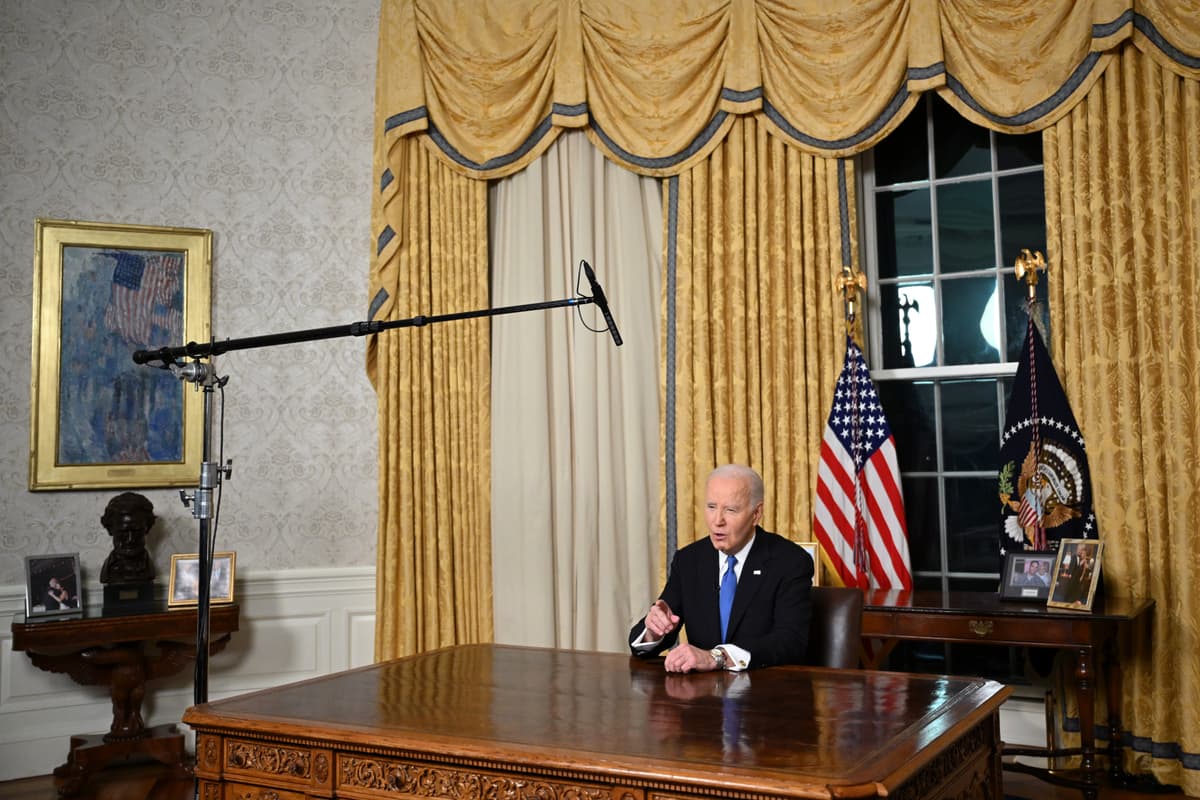Biden’s Foreign Policy Failures Overshadow His Hope of Restoring the ‘Soul of America’
It started with Afghanistan and seemed to go downhill from there.

As President Biden’s 50 year career in politics draws to a close, his mission to “restore the soul of America” will likely be overshadowed by his foreign policy legacy — and in ways none-too-flattering.
“History will likely judge this presidency most harshly in foreign policy and with good cause,” a senior advisor at the Foundation for Defense of Democracies, Richard Goldberg, tells The New York Sun
“These four years will likely most be remembered for the disastrous withdrawal from Afghanistan, the tacit green-lighting of Putin’s invasion of Ukraine, and an Iran appeasement policy that set the Middle East ablaze — all while China grew stronger and more aggressive.”
Afghanistan Debacle
When Mr. Biden assumed office in January 2021, he enjoyed favorable ratings. The chaotic withdrawal from Afghanistan in August, however, marked a turning point in his presidency. The withdrawal ended America’s longest war but left behind harrowing images of desperation and disorder at Kabul’s airport.
The Taliban’s rapid takeover and the loss of 13 American service members during the operation drew sharp criticism at home and abroad. By the fall of his first year as Commander-in-Chief, Mr. Biden’s approval ratings had plummeted, setting the tone for a presidency increasingly dogged by controversy.
Mr. Goldberg refers to the chaotic Afghanistan exit as “the symbol of American failure and weakness.”
“The image of people falling from landing gear is ingrained in a generation of Americans and American adversaries. There is a direct line between the withdrawal, Putin’s invasion of Ukraine and Iran’s seven-front war against Israel,” he continued. “And China emerges as the largest strategic benefactor. Trump will need to produce new images of American strength at the outset to right the ship of state.”
Africa and the Final Foreign Trips
In the twilight months of his presidency, Mr. Biden embarked on a series of foreign trips intended to cement his legacy as a global statesman — only these visits underscored his physical and cognitive challenges. During a six-day trip to Peru and Brazil in November, involving meetings with leaders from 30 nations, Mr. Biden made minimal public remarks and answered just one reporter’s question.
His response, delivered in a subdued tone, went largely unnoticed. The Biden administration’s commitment to Africa has also faced pushback for lacking strategic depth and failing to amount to much progress despite hosting the 2022 United States-Africa Leaders Summit designed to strengthen ties.
In December, Mr. Biden endeavored to fulfill a last-minute campaign promise to engage with the continent, becoming the first sitting U.S. president to visit Angola. The trip, focused on a U.S.-financed rail project to counter China’s influence, included several awkward moments.
At a meeting with African leaders, Mr. Biden closed his eyes for prolonged periods, raising questions about his attentiveness. In a ceremonial walk with Angola’s president, João Lourenço, the 70-year-old leader physically guided Mr. Biden, illuminating his frailty. The president also opted not to tour Luanda’s national slavery museum, avoiding its steep steps and instead viewing artifacts brought outside for him.
In another effort to leave a positive footprint on Africa, the administration in early January officially designated the atrocities committed by the Rapid Support Forces in Sudan as genocide.
This signaled a critical acknowledgment of the crisis; however, the designation — which legally compels the United States to act — came far too late, conveniently exempting the Biden team from taking effective concrete action to hold perpetrators accountable and deliver humanitarian aid.
The scrutiny doesn’t end there.
The China Factor
“The greatest failure of all, perhaps at a catastrophic level, was failing to sound the alarm on the state of America’s defense industrial base,” Mr. Goldberg said. “And handing Trump a Pentagon that is fundamentally unprepared for a war with China.”
The Biden administration’s approach to China has been viewed by many as inconsistent, swinging between tough rhetoric on issues like human rights abuses in Xinjiang, the crackdown in Hong Kong, and military aggression in the South China Sea, and calls for cooperation on global challenges such as climate change and the pandemic.
America imposed sanctions on Communist Chinese officials over human rights violations but also sought the People’s Republic’s collaboration on reducing carbon emissions. The Chinese spy balloon incident, along with itss growing meddling in American affairs and its military build-up in the South China Sea, has seemingly been met with indifference by Biden’s Washington, further raising doubts about the administration’s resolve to confront Beijing’s aggressive actions.
This mixed strategy has created uncertainty about American intentions, leaving allies unsure whether the focus is on countering China’s rise or managing a complex partnership while complicating a unified global response to China’s growing influence.
Not everyone sees it this way.
The director of the Center for Intelligence and Security Studies at the University of Akron, Karl Kaltenthaler, tells the Sun that there have been “some significant successes in U.S.-Chinese relations since Biden became president.”
“They might not seem like major breakthroughs in better relations, and they are not, but they have diminished the tensions between the two superpowers,” he explained. “There are several new or re-activated forums for talks between China and the U.S. during Biden’s term that have facilitated greater communication, transparency, and cooperation on issues such as military-military affairs, fentanyl trade, cyber issues, etc. But Biden has not been able to change the trajectory of deepening distrust and competition between the U.S. and China.”
Mr. Biden’s White House has also been condemned for a lack of decisive action in response to Burma’s 2021 military coup and the military dictatorship’s ongoing human rights abuses, raising questions about its commitment to promoting democracy and human rights globally.
Praise and the Restoration of NATO
The outgoing president’s foreign policy has faced significant scrutiny yet has also delivered what some observers consider key wins on the global stage, particularly in Europe.
Under Mr. Biden’s tenure, NATO experienced a revival after years of perceived decline during the Trump administration and welcomed two new members – Sweden and Finland. Foreign policy experts and international heavyweights praised Mr. Biden for leveraging decades of diplomatic relationships cultivated during his Senate and vice-presidential years to restore confidence in the alliance, which was widely as a storied accomplishment.
NATO proved crucial in responding to Russia’s 2022 invasion of Ukraine. The United States, under Mr. Biden’s direction, spearheaded a Western effort to provide billions of dollars in military and humanitarian aid to Ukraine.
Some perceived this support as having helped Ukrainian forces resist Russian aggression, turning what many feared would be a swift conquest into a protracted conflict. In contrast, others see his administration’s cautious approach as a disaster.
“Biden dragged his feet on giving Ukraine what it needed to win for two years. He all but greenlighted the invasion, withheld critical weapon systems, put conditions on the systems he provided, and devised a sanctions regime on Russia that had more holes than Swiss cheese,” Mr. Goldberg noted.
“For as much as western Europeans complained about Trump’s America First style, Biden’s never-ending fear of escalation and failure to lead left them completely unprepared to defend their continent.”
The Middle East
In dealing with Saudi Arabia, Mr. Biden’s initial pledge to hold the kingdom accountable for human rights abuses was undercut by a high-profile visit that prioritized energy security over accountability. While the administration publicly condemned the Saudi regime’s actions, Biden’s decision to engage directly with Crown Prince Mohammed bin Salman angered human rights advocates and created a divide within his own Democratic Party.
Efforts to revive the Iran nuclear deal have also floundered, with Biden’s attempt to return to the 2015 agreement facing repeated setbacks due to Tehran’s continued missile tests and its refusal to fully comply with the terms. The administration has also failed to offer a coherent strategy to contain Iran’s regional influence, leaving the Middle East in a state of uncertainty.
Biden’s inability to broker a lasting peace agreement or push back decisively against Tehran’s nuclear ambitions has drawn sharp criticism, especially in light of the administration’s broader efforts to reposition the United States away from direct military engagements in the region.
Legacy and Final Reflections
How much Mr. Biden’s legislative and foreign policy decisions will endure through Trump’s next term remains uncertain. What is clear, however, is that Mr. Biden’s presidency marked a pivotal moment in America’s global and domestic trajectory—leaving a legacy for future generations to debate and assess.
As it stands now, from the lens of the president of the Global Situation Room, Brett Bruen, former director of global engagement at the White House under President Obama, Mr. Biden departs on more lows than highs.
“Biden leaves office having damaged American diplomacy and made the world a more dangerous place. It was quite the opposite of what he promised,” he tells the Sun. “Yet, poorly implemented ideas and an inability to acknowledge mistakes compounded crises. Stubbornness is not a strategy and often blinds leaders to problems, as well as possibilities.”
Mr. Bruen calls the outgoing president’s “most significant foreign policy accomplishment” — the bringing together of traditional allies to support Ukraine — “fleeting” and surmises that Mr. Biden has “managed to find the worst of all worlds.”

